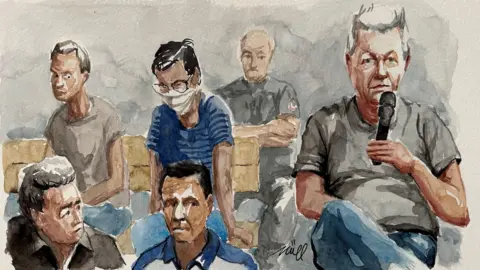ARTICLE AD BOX

 BBC
BBC
Dominique Pelicot - captured in photos and a court sketch - has been sentenced to 20 years in prison
It was something in Dominique Pelicot's swagger, his "élan" - as the French might put it - that immediately struck the psychiatrist as odd.
There he stood. A 68-year-old pensioner who had already spent several months inside one of France's most notorious prisons, Les Baumettes in Marseilles. The prison was a grim, intimidating place, crowded with members of the port city's warring drug gangs.
And yet the man in the visiting room who rose to greet Dr Laurent Layet on a cold day in February 2021 seemed "clean, polished… He had just cut his own hair. He came towards me with this assertive attitude." Dr Layet was surprised, to put it mildly.
The psychiatrist was the first of many people to scrutinise Dominique Pelicot. Each expert was looking for clues to explain how this apparently genial pensioner could have committed such grotesque crimes and deceived his unsuspecting victim for so long.
In all his years interviewing hundreds of rapists and suspected rapists on behalf of French police and prosecutors, Dr Layet had never come across anyone quite like this grey-haired former electrician, calmly awaiting prosecution for drugging his wife Gisele and inviting dozens of strangers to rape her as she lay, unconscious, in the couple's bedroom.
"Something didn't fit. I had never encountered such an exceptional case," Dr Layet remembers thinking at the time.


Psychiatrist Laurent Layet was struck by Pelicot's assertive attitude in prison
At the end of a gruelling, four-month trial that has enraged people across France and far beyond - even as they were inspired by the dignity and courage of Gisele - Dominique Pelicot's confident demeanour, a grandiose presence in the courtroom in Avignon, remained intact.
One might expect a man in Pelicot's position - a globally reviled sexual predator, and rapist, facing the near-certain prospect of dying in prison - to cut a wretched figure. And there have been a handful of brief moments when he wept, openly, in court - usually for himself.
But for the most part, he struck an imperious pose, courtroom microphone in one hand, his body slouched in a throne-like chair (to accommodate the accused's health issues), sometimes looking bored, occasionally interjecting like a ringmaster seeking to keep an unruly circus - the 50 other men on trial beside him - in their place.
"I am a rapist, like the others in this room. They knew everything," he intoned, speaking with the confidence of a man who assumed his words would put an end to all further discussion.
But what are we to make of that domineering performance? And what have we really learned of this jowly, grey-haired figure, with his black cane and scarf, seated in a glass cage; this serial rapist whose cruelty has almost been eclipsed in the public imagination by the dignity and courage shown by his former wife?
Dr Layet first encountered Dominique in the late summer of 2020 at a police station in the nearby town of Carpentras, immediately after his arrest for filming with a camera up women's skirts in a local supermarket. Called in to assess Pelicot, Dr Layet noted how breezily he dismissed his crime, like a genteel grandfather caught pocketing a few cigarettes.
Dr Layet detected a "dissonance" in the man's behaviour, and the strong implication that he was hiding something more serious. He told the police that this one was worth closer inspection.

 Reuters
Reuters
Pelicot's largely maintained a confident demeanour throughout the trial
In court, years later, after two long prison interviews with Pelicot and with more than 20 of the other accused, Dr Layet presented a more detailed assessment to the panel of judges.
A measured and eloquent expert witness, Dr Layet stressed that Pelicot exhibited no signs of severe mental illness. He could not be dismissed as a "monster". Nor was he psychotic - unable to tell reality from fiction.
And yet. There was a "fissure", a split, in Pelicot's personality.
A showier witness might have borrowed from popular culture to compare him to a tormented Dr Jekyll and Mr Hyde, or perhaps to Hannibal Lecter, stiff-backed in his prison cell in The Silence of the Lambs.
Instead, Dr Layet reached for a mundane image.
"Almost like a hard drive," he suggested. A fitting metaphor, given that Pelicot had stored video evidence of his crimes on a computer memory card.
Later, in an interview with the BBC at his office in Carpentras, Dr Layet explained that Pelicot's mind had become divided, over time, like a partitioned computer disk, into two entirely separate "water-tight parts… with no leakage between them. His split personality is very effective and very solid. We either have the 'normal Mr Pelicot' or the other Mr Pelicot at night, in the bedroom."
Asked in court to explain that "other" Pelicot, Dr Layet said that he had detected a range of emotional and sexual abnormalities. They are, perhaps, most neatly captured in their original French, in a prosecution document seen by the BBC:
"Egocentrisme, fragilite narcissique, perturbations emotionnelles… une deviance paraphilique melant candaulisme, voyeurism et somnophilie."
"Egomania, narcissistic fragility, emotional disorders... an abnormal sexual deviancy combining candaulism [exposing your female partner to others for sexual enjoyment], voyeurism and somnophilia."
Pelicot's own defence lawyer, Beatrice Zavarro, enthusiastically embraced the "split" personality theory in her closing arguments at the trial. She suggested that the charming young man Gisele Pelicot had fallen in love with and quickly married back in 1973 "was not the man that had harmed her".

 Getty Images
Getty Images
Gisele Pelicot was surrounded by well-wishers outside court
But that is not what Dr Layet - or the other psychiatrists we have consulted for this article - meant.
There may be two sides to Pelicot's behaviour, but there is - to stick with Dr Layet's computing metaphor - only one operating system that controls his cruel, private urges and his public demeanour.
A simpler way of putting it is that Pelicot has an antisocial personality disorder - a term preferred by psychiatrists these days to words such as psychopath or sociopath. Several experts have concluded it is a reasonable diagnosis to use in the context of Pelicot's warped mind.
He is not "mad" - he cannot claim diminished responsibility for his actions. But he does show well-established traits of a personality disorder characterised by a lack of empathy towards other humans. Those traits may have been sharpened by the sexual abuse he experienced as a child.
Which brings us to another key question. Did Pelicot only become a rapist in retirement, or was he preying on women long before he began drugging his wife?
Sitting towards the back of the courtroom one Tuesday afternoon late in the trial, surrounded by journalists tapping away on their laptops, Florence Rault looked at Dominique Pelicot with a particularly well-informed sense of disgust.
"It can be assumed that what happened in Mazan… is only the culmination of a long process," she said later, in a BBC interview.
Ms Rault, a lawyer specialising in criminal cases, knew something deeply troubling about Pelicot - allegations of appalling crimes arguably more disturbing than those for which he was about to be convicted.
For many years, she had been fighting for justice for two women who were the victims of violent ordeals in the 1990s.


Florence Rault says Pelicot was a calculating predator
More than 20 years before the rapes for which he has now been sentenced - in 1999 - Pelicot is accused of assaulting and attempting to rape a 23-year-old estate agent, known by the pseudonym Marion, in the suburbs of Paris. She fought the attacker off.
He eventually admitted to being present at the scene in 2021 after DNA - a spot of blood on the victim's shoe - was finally found to match Pelicot's. But he continues to deny he attempted to rape her and the investigation continues.
"Once he was told that his DNA was found at the crime scene, he said 'Yes, it's me,'" Ms Rault remembered.
And that discovery quickly led to a link to an even older cold case. In 1991, another young estate agent, Sophie Narme, had been raped and murdered. Although crucial DNA evidence had gone missing, the similarities between the scenes were so striking that Pelicot is under investigation for the crime, which he denies. The search for other potential links to older crimes is also ongoing.




Ms Rault is not expecting any more confessions from Pelicot in relation to the cold cases.
"Until he's confronted with indisputable proof, he will deny [everything]," said Ms Rault, who once sat beside Pelicot at a hearing and was struck, like Dr Layet, by his "relaxed, rather serene" demeanour.
Ms Rault now watched him in the Avignon courtroom and saw the same behaviour. She also noted how Pelicot emphatically and tearfully denied drugging and raping his own daughter, Caroline, despite having taken deeply troubling photos of her, asleep, and without her knowledge.
"She's convinced that he sexually abused her too. But since we don't have any formal evidence like DNA to put in front of him, of course he will continue to deny it," said Rault, arguing that, for Caroline, the agony of uncertainty was as cruel and traumatic as the suffering of a victim who knew exactly what had happened to her.

 Handout
Handout
Pelicot is also being investigated for the rape and murder of Sophie Narme in 1991
Pelicot's attitude towards his family in court was often revealing. The psychiatrist, Dr Layet, pointed out that the accused narcissistically focused on the love his wife and children once felt for him, not his betrayal of their trust.
For Pelicot, this "started out as a love story" and he "doesn't want this to be ignored", said Dr Layet.
But Ms Rault had come to court to look for other signs. Above all, she wanted to shore up her sense that Pelicot's crimes were highly premeditated.
"Serial rapists… usually have an impulse. They commit rape. They leave, and then they forget. This is not the case with [Pelicot] at all," she said.
Ms Rault recalled the methodical actions of Marion's attacker inside an estate agent's office in 1999. The way he had made an excuse to return to his car - almost certainly to collect a rope and a bottle of ether to drug her. Then Ms Rault noted that the man in the glass cage in Avignon demonstrated a similar self-possession and saw it as further evidence that this was a deeply calculating criminal.
"When he says he has urges and acts on impulse, it's nothing like that. He is very calm."
On the same day that Ms Rault was in the Avignon courtroom, I was sitting nearby. Gisele Pelicot was a few metres to our right. Dozens of the accused sat in front of us. Dominique Pelicot was over to the left side of the room.
During a break in proceedings, I walked over to him. According to French law, journalists are not allowed to talk to the accused. Instead, I stood for a while and watched him as he sat in his chair, behind his glass wall, one hand on his stick. Then his head turned towards me, and he held my gaze for what must have been 20 seconds - although it felt much longer.
His expression did not change. He did not seem to blink. And then, like a bored man switching between equally boring television channels, he looked away.

 3 weeks ago
10
3 weeks ago
10








 English (US) ·
English (US) ·